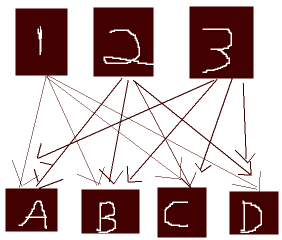Co Citation – A major search engine ranking factor that few SEO’s understand.
What is Co Citation?
I found a nice page on sourceforge.net that gives a nice definition of co citation.
Bibliographic Co-Citation is a popular similarity measure used to establish a subject similarity between two items. If A and B are both cited by C, they may be said to be related to one another, even though they don’t directly reference each other. If A and B are both cited by many other items, they have a stronger relationship. The more items they are cited by, the stronger their relationship is.
Now it’s past 11:00 pm, and my designer has gone home for the night, so here’s my chicken scratch of co citation.
Sites A, B, C, & D are said to be related via co citation. They don’t link to each other, but sites that link to them, tend to link to the other sites.
Let me try to put this in more SEO english by showing you Good and Bad examples of co citation.
Let’s pretend you have a site about sunglasses and you’re on the hunt for backlinks. Let’s say you bought a link on a page where you’re link looks like this:
| Paid Advertisers: Sunglasses Cheap Viagra Casino Betting Online Gambling |
Online Casinos Gambling online Cheap Drugs Online Phentermine Cheap Prescription Drugs |
By doing this, the search engines will think that your site must have something to do with prescription drugs and gambling. Why? Well, because the search engines look at the pages that link to you, and they say "Who else does that page link to" because they figure they must be related. So your sunglasses sites is now thought to be related to gambling and drugs. That’s your neighborhood you’re putting your site in.
Now let’s say that you buy lots of links…and let’s say that the gambling sites also buy lots of links…and let’s say that on lots of pages where you buy your links, they also buy links…now you’ve got some serious co citation going on…even though you never link to each other, your backlinks keep appearing together on other sites…now you’re considered similar to the gambling sites (this is bad for rankings).
Now let’s look at some Good Co citation:
Getting a link from a directory page, like say a Yahoo Directory page for Sunglasses, is Great for your co citation….why? Because the other links on that page are all about sunglasses, and if you’re listed on that page, then the search engines will give you the co citation of "sunglasses" (by looking at the other links on that specific page that links to you). Now let’s say that you’re also in DMOZ with a lot of the same sunglasses companies are were in the Yahoo Directory pages…now you’ve got some serious co citation…and this time, you’ve got it with the right types of sites (other sunglasses sites), so you’re getting into the "Sunglasses Neighborhood" via lots of co citation with other sunglasses sites (this is good for rankings).
Want to know your websites co citation?
Hey, it’s actually pretty easy….the engines actually show you. It’s one of those things that people see every day, it’s just that most people don’t know what it is.
Yea…it’s that that "Similar pages" link next to the "Cached" link (You can also search in Google using the Related command (related:www.your-site.com)).
You ever wonder what those Similar Sites are? That’s your co citation! That means that the web pages that link to you, tend to link to those sites as well. More often than not, the top ranked sites have good co citation (related sites as their "Similar Pages").
If you’re trying to rank high, keep in mind your linking neighborhood and your co citation. On the pages where you’re getting links from, who else do those pages link to? Are the other links on those pages related to your site? Is that co citation something that will help or hurt you?
What are your thoughts on co citation?
——————————–
[tags]links, link building, google, yahoo, seo, sem, search engine optimization, internet marketing, search engine marketing, link popularity[/tags]






35 Responses
This is a thing I’ve figured out a long time ago. It’s kind of natural. Think natural. You won’t be wrong. Then apply the SEO knowedge. Here we are, on top of the rankings 😉
The question then becomes, for what keywords does co citation help your rankings, and why. If your site becomes part of a neighbourhood, do you start to rank well for specific terms that appear on other sites in that neighbourhood, but aren’t necessarily in your copy. Or does co citation only strengthen your ranking for terms appearing in both yours and the related websites copy? A third option – do search engines identify a ‘set’ of keywords that apply to a neighbourhood and then rank all sites in that neighbourhood better for those words, regardless of copy on any of the sites.
You also point out that ‘bad’ co citation is bad for rankings. Do you therefore think that you’ll tend to lose rankings for terms that are totally unrelated to the sites in your neighbourhood?
Jim, this is a REALLY good post… getting into the more nitty-gritty details that you don’t see discussed everywhere.
Thanks for putting it all together Jim, always wondered about this.
Jim,
Thanks for this. You had explained all this to me last year, long before I’d seen the idea of neighbourhoods ‘out in the wild’ and discussed publicly. Personally I think this concept is an absolute natural for the SE’s to be watching for – and thus something we should be looking for as SEO’s. I’ve been sticking to it since you told me about it.
The fact that you were willing to openly discuss this at such an early juncture – particluarly with a non-player such as myself – is just one example of why you are well respected in the community. Your commitment to sharing information is commendable – thanks again.
Excellent posting, definitely good information not really found elsewhere. I definitely find people have no clue what co-citation or the “similar pages” links are, I guess that works better for us.
Solid post.
Similar, I think, to the concept of a hub. If a page is linking to many of the top pages for your given keyword, you’d be well served to get your link there, too (in many cases).
Which makes hubfinder such a cool tool.
Are there points on which hubs and co-citation differ? I suppose hubs are more of a popularity concept, while co-citation deals with relevance.
very nice post, Jim! hey congrats on the new baby coming soon too. 🙂
yes, It fits right to the brazilian saing “tell me who walk with you, and I gonna tell you what you are” 😉
thanks and congratulations!
– gess
Great explanation of the importance of making the investment for the Yahoo Directory, and the (futile) effort to get on DMOZ.
Terrific article and great illustration!
Thanks for the post, Jim! Great blog 😀
Lynn Terry
I did something like this by accident to Hot Pockets when I ranted about them being Lava Pockets and next thing I knew a couple of weeks later Hot Pockets suddenly appeared in Google in the top 10 next to web sites about volcanoes.
Now they’ve sunk way down to around 80 when you search for Lava Pockets and I’m #1 for the term and rightly so 😉
Nice post. I particularly like when bloggers support MS paint 😉
Wow, this is one of the most enlightening blog posts I’ve read. *Bookmark*
A couple questions:
1. This seems to imply that directories are in fact worth while. Considering co-citation in isolation, even free directories that have a *decent* approval process would benefit your cocitation rating. Any thoughts?
2. What are your thoughts on the potential for this to be abused? I am a little concerned by the fact that a competitor could create a fictitious porn site, put 100 outbound links to porn sites, and include my site among those so that I get a “black label.”
3. Does this include internal links? e.g. If I have a site selling chinese food ingredients and I get a link on a site that has irrelevant outbound links BUT relevant internal links, such as a supage covering “Making Chinese Food,” “Choosing the best Chinese Food Ingredients,” etc, would this be to my benefit under the co-citation theory?
Thanks, again this is one of the most useful blog posts I’ve read.
Sorry, forgot one more:
4. What does it mean if your site has many backlinks but the similar pages link brings up “Your search – related:allswords.com/ – did not match any documents.”?
kkibak,
Good questions
#1 – yes, exactly….if the directory page where you’re seeking your listing has a google cache from less than 2 months ago.
#2 – yes…but the odds of “abuse” are very low…but yes….”there is almost nothing a competitor can do to harm your rankings” (to quote from Google)….almost nothing…
#3 – great question..and not an easy answer…I believe google looks at sites in 2 ways… on a “per page” basis, and a “site wide” basis….a quick answer is to keep both these in mind.
#4 – I’d guess that means that your backlinks are not common with anyone else…might be your site is “new”…or no one shares common backlinks with you. Good news is that at least it’s not a bunch of non-relevant sites….bad news is there are none your similiar to….yet…start it good, get common backlinks….best way is to use our new tool at http://www.webuildpages.com/tools/common-backlinks/ this is the best way to improve ones co citation. (get links from those sites).
Hi Jim, Cannot tell you how many times we have recommended this article. After recommending your article countless times, we have made it official by blogging about it at REW. Morgan says Hi, BTW!
This is a good post especially for link builders that expalins about the search engine ranking factors and relationships of sites in link building.
Really Great info, but i have smaal doubt.
when we search related:www.mysite.com then it shows less results and when we put the space between related: and http://www.mysite.com like related: http://www.mysite.com. I am confused.
Can you please tell, which is right way?
The use of a space in a Google search command breaks the command. For example, searching for ‘site:cnn.com’ will return all of the indexed pages of the CNN domain while searching for ‘site: cnn.com’ returns the same results as if you had searched for ‘site cnn.com’.
You want to use ‘related:your-site.com’ unless you’re trying to find all of your pages that have the word “related” on them. Google only displays 25-30 results when you search for your related pages
Interesting post. Never heard of cocitation before. Definitely something to consider with SEOing. Thanks.
Sweet info there mate, thanks.
Note to self: Never use Paint to illustate a point, unless drawing stick figures for show and tell.
This is similar to “Link Neighborhoods,” correct?
Pretty advanced information on your site which I found very precious. I’m reading a lot of articles here and this is the first time I hear of co citation. I’m impressed how little I know… =)
Comments are closed.